If there's such thing as Conversion Rate Optimization (CRO) nirvana, it may be Unbounce's annual Call To Action Conference in Vancouver, Canada. A thousand or so digital marketers come together to share and learn...and I loved every minute of it.
This year was my third CTAConf and by far the best. Even though I was fortunate to present on the main stage last year, I actually got to enjoy this year's conference as an attendee and workshop presenter. If you're interested, here's my presentation on building a scalable LPO process in your organization.
All 20 speakers were fantastic but it's too much to cover in one post. Here are a few of my favorite moments and takeaways from this year's main stage.
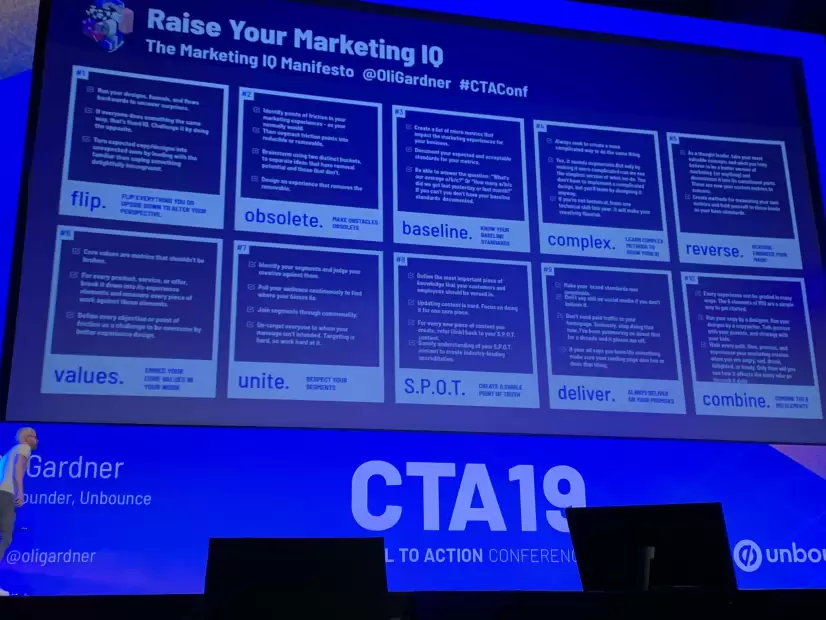
Oli Gardner, Unbounce
Marketers need to raise their Marketing IQ when designing experiences.
Bad design isn't just a missed opportunity to convert a customer. It can negatively impact your brand, reviews, word of mouth, and ability to change perceptions in the future.
Oli is great at distilling complex issues down to simple frameworks. It will take time to process all of his ideas but it's always good to challenge our assumptions and methods. It's the only way to continuously improve.
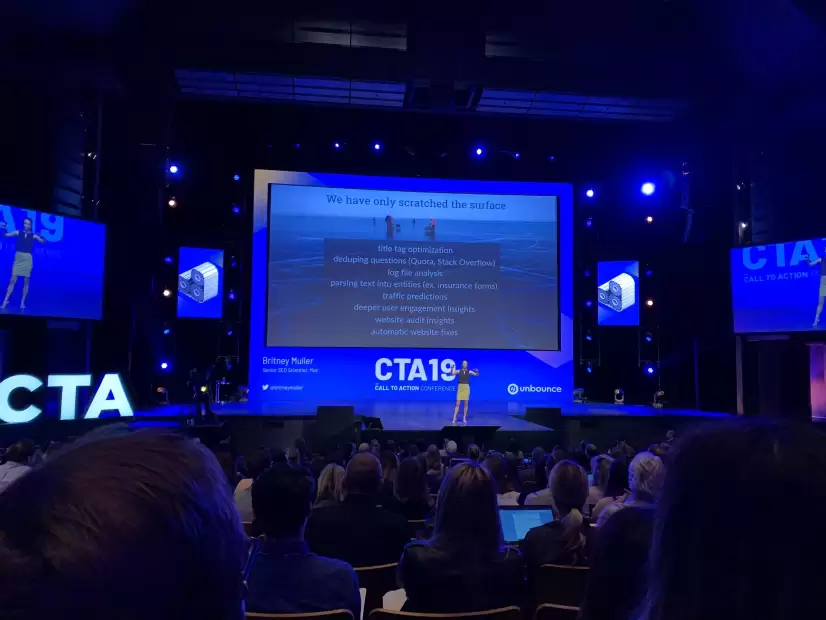
Britney Muller, Moz
Machine learning doesn't solve well for human/emotional issues but can help us solve other complex challenges.
Anybody can use Machine Learning (ML) tools and build models to analyze large data sets and predict outcomes. Spreadsheets are OK for smaller data sets but are not as adept at layering in multiple dimensions. When done right, ML frees us up to work on higher level strategy.
Text generators can automate copywriting. Natural Language Processing (NLP) can recognize entities and concepts in existing content. Google's Vision AI (and others) can detect objects, faces, and emotions in photos. AI-driven video generators can automatically create videos from multiple content types. These are just some of the tools available to marketers and data analysts for automating and scaling mundane tasks.
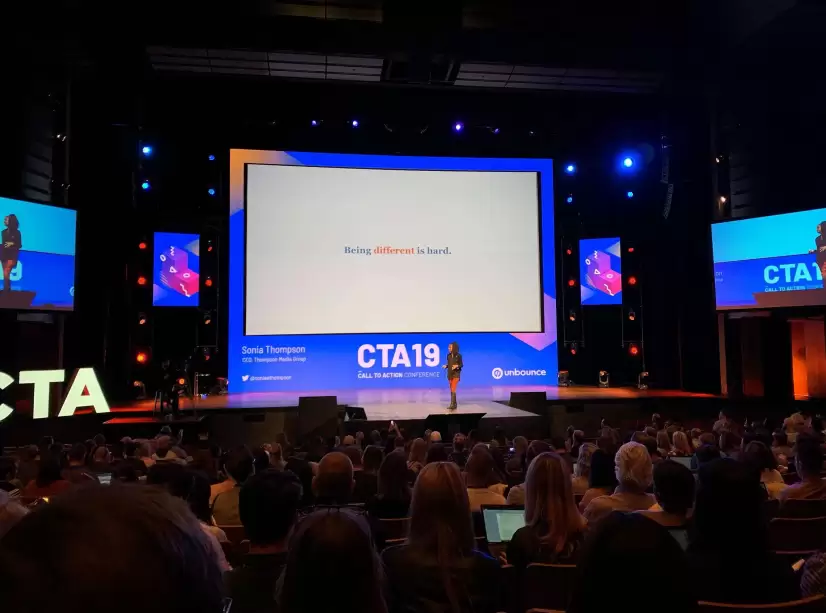
Sonia Thompson
Smart businesses treat their customers as friends.
Success in relationships and business comes from creating feelings of belonging in others. But many businesses don’t create inclusion or create long lasting relationships with customers. They only ask and don’t give.
Buyer personas and qualitative data can help you figure out which products to create and how to make them relatable. Customers that don’t feel like they belong are getting signals that they don’t matter.
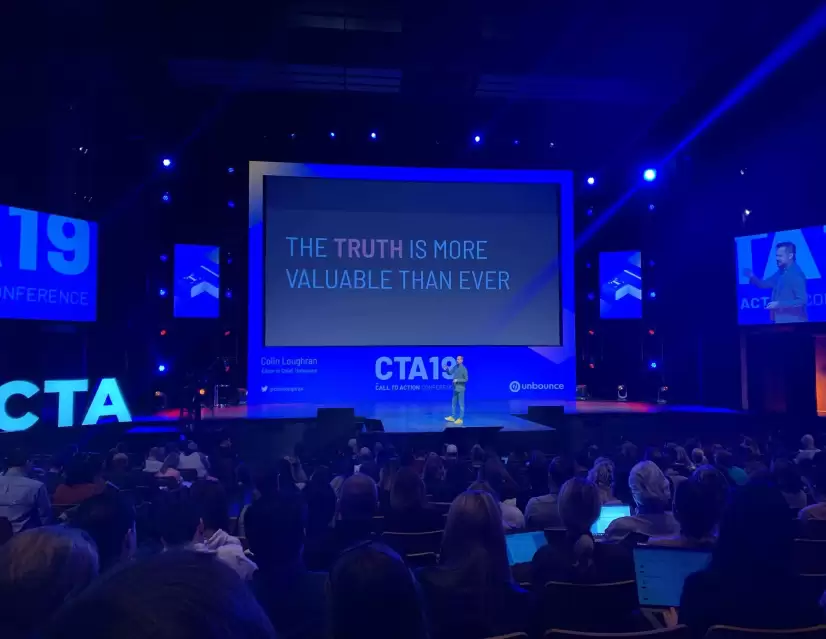
Colin Loughran, Unbounce
Content writers and content marketers fall victim to confirmation bias and we need to do better.
Human nature is to find facts that support our worldview and ignore facts that oppose our views. Content writers are guilty of this as well and it results in thin, poorly researched content that prioritizes speed and sensationalism over accuracy and depth.
Basic fact checking has fallen victim to the desire to publish more content and rank well in search results. Ranking algorithms don’t factor in content accuracy and search engine results pages are increasingly uniform and bland. Worst case scenario, our collective IQ drops and we lose focus on knowledge.
The truth is more valuable than ever. Content needs to have integrity and be a source of truth for our audiences.
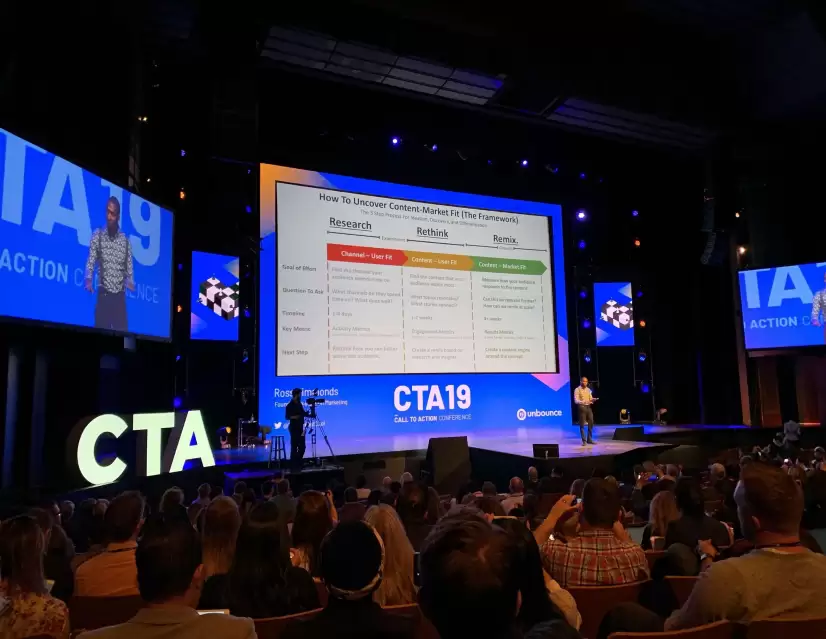
Ross Simmonds, Foundation Marketing
Research, Rethink, and Remix your content to find the right content mixes for your goals.
Ross is definitely one of the most entertaining speakers on the digital circuit right now. He shared a framework to "Research, Rethink, and Remix" content ideas to make it yours and make it better than everybody else's. Content planning relies on more than keyword research and should include consideration for the channel, user, and content-market fit for each audience.
A scalable, replicable, measurable content marketing strategy improves your chances of success.
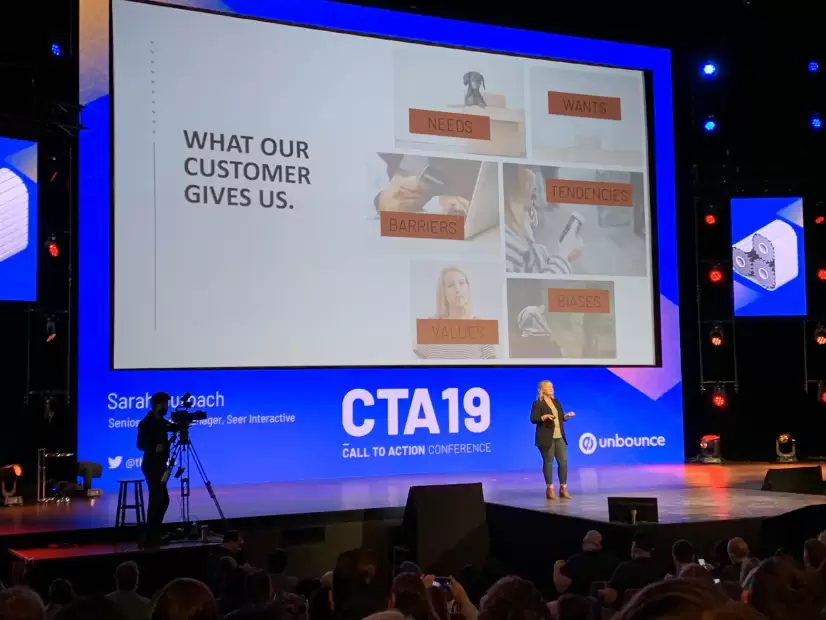
Sarah Gurbach, Seer Interactive
People are not data points. Only your customers can tell you their stories.
Sarah shared her best tips for collecting user feedback to develop content and audience strategies. Marketers need to go beyond keyword research and collect qualitative data to paint a full picture of their customers.
- Define your objective. Write it as a question. Keep it specific & focused.
- Observe behaviors with user testing tools. Identify patterns and opportunities to create or format content to match user intent and browsing patterns.
- Ask your customers about why they purchased and why they chose you. “Tell me about the day you purchased this item?” can lead to stories. “What information would have been helpful but was missing?” can surface objections and concerns.
- Quantify and aggregate behaviors and metrics to validate your observations from steps 2 & 3.
Remember that customers are people and a little bit of empathy goes a long way towards creating better experiences and improving conversions.
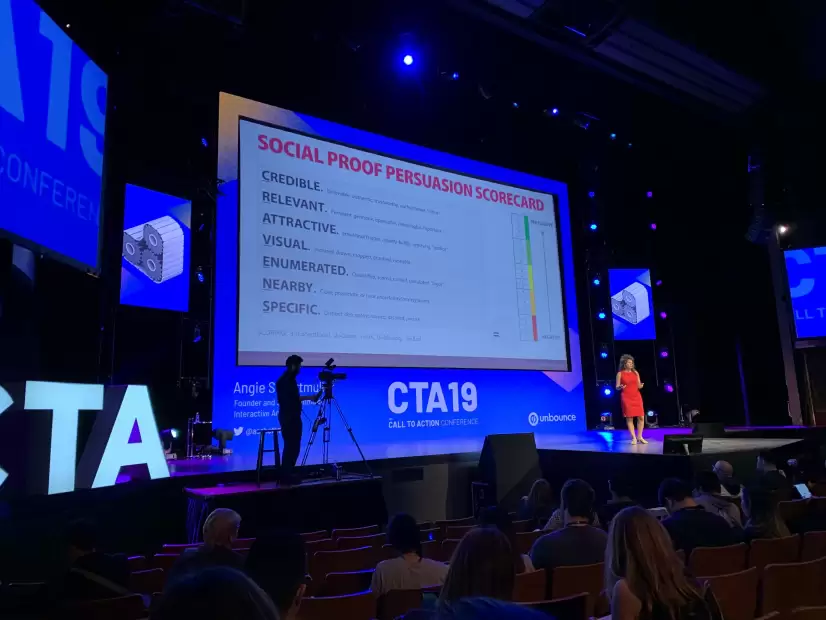
Angie Schottmuller, Interactive Artisan
The heart of persuasive testimony is an art and a science.
Angie always brings fresh ideas and forces her audience to do better. She shared her tips for soliciting and distributing user testimonials, reviews, and ratings.
Her framework was pretty robust but it starts with asking people for a satisfaction interview that can lead to positive testimonials. Follow up with a request to share it online. Then direct them to the appropriate reviews sites.
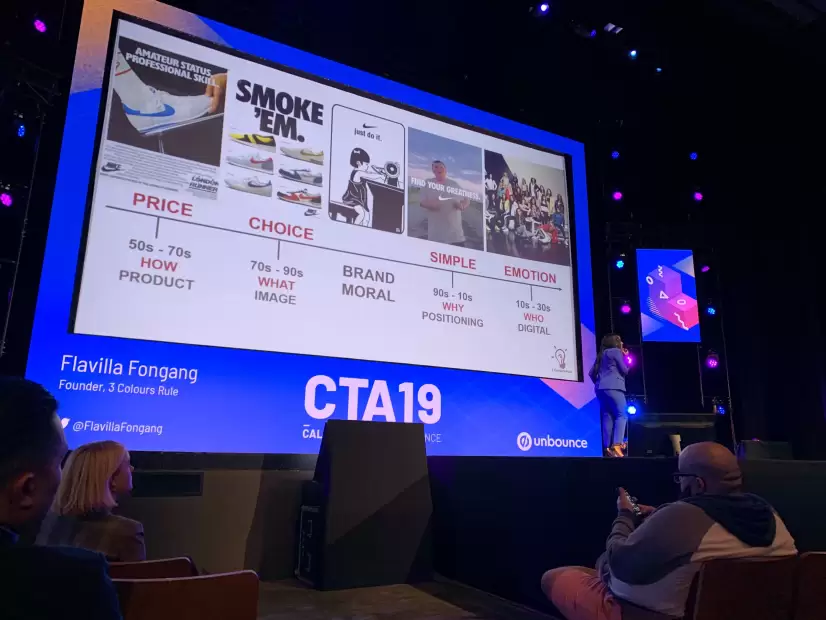
Flavilla Fongang, 3 Colours Rule
Keep your customers faithful by going beyond the expected.
Supporting your customers’ goals creates attachment with your brand. For example, Nike’s training app helps people accomplish their fitness goals and only indirectly promotes Nike products as a means to an end. Apple helps people be more creative and productive with hardware and services.
Innovation should be baked into your brand offerings and reflected in your company culture. Strategic alliances help your brand reach new customers with mutually beneficial offers and instant credibility.
People’s reptilian brains control our “fight or flight” responses and force us to take a self centered view of our own needs and objectives. Speak to your customers in their terms and not yours.
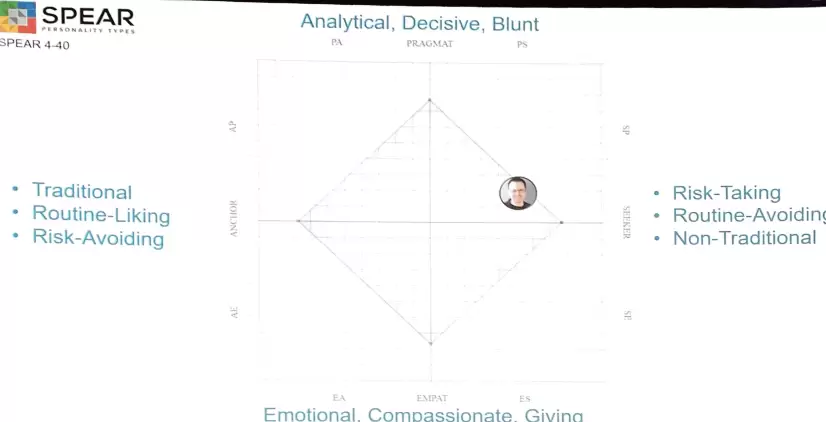
Brian Cugelman, AlterSpark
Marketers are confused about the differences between segments and personas.
Dr. Cugelman shared some interesting research about our human tendencies and how we develop personalities that can be incorporated into marketing messages. Emerging researching suggests that biomarkers and genetics make up about 40% of our personalities. Personalities are different from personas and segments. A persona is a statistical representation of the segment but is often used interchangeably. A behavioral scientist would be quick to point out the differences.
The concept of “social proof” in marketing is too broad and can be expanded to include social comparison, social norms, social facilitation, cooperation, competition, and recognition.
Translating these insights into digital strategies and design can dramatically improve performance by speaking to each segment differently based on their unique drivers.
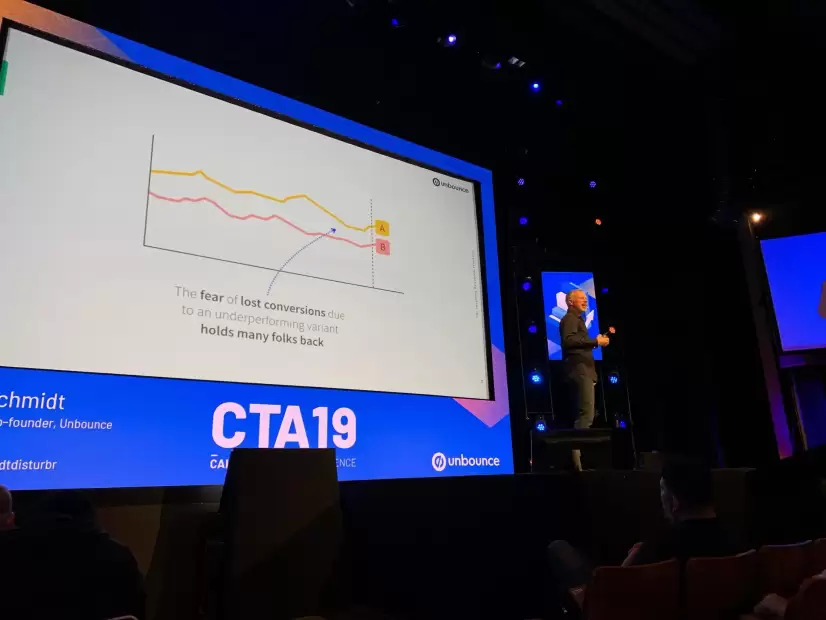
Carl Schmidt, Unbounce
A/B testing isn't the only (or best) way to measure landing page tests.
Marketers are challenged to find better ways to use AI to improve our processes and performance. Tools are moving from a “one size fits all” approach to a “custom fit” or 1:1 approach. Not all tests are equal and not all visitors are equal. Can AI craft the perfect page for each visitor? Not yet but we are moving in that direction.
Split testing (A/B testing) has helped us move beyond opinions and use data to make decisions. But it can be slow. It takes time to gather results and get a conclusive data. It is also impossible to design one landing page that works for everybody.
Can we do better than random selection? Traditional A/B testing is rolling the dice. The future of landing page testing will include AI-driven optimization that factors in more signals to match the right page variant with the best chance to convert an individual user.
We can learn a lot from a click. Geolocation, device type, time, day, etc. While these signals don’t include intent, there is evidence that total conversion rates can be improved by applying AI to A/B testing.
I, for one, am excited to see our robot overlords augment our landing page testing strategies.
So many takeaways and ideas to test.
In closing, the 2019 CTA Conference was a huge success and well worth the trip across a continent. I got to spend a lot of time with many people from the Unbounce Team. They all said the same thing, “The conference is a lot of work but it’s the best week of the year.”
As a speaker and attendee for the third time, I have to agree on the “best week of the year” claim. So much of the value comes from the community of users, employees, and other marketers and I learn just as much between sessions as I do in the keynotes.
The Unbounce culture and values shine through in every detail. This openness and welcoming vibe keeps people coming back. More so than other conferences in the digital space, CTA Conference is authentically friendly. It sounds easy but as the team will tell you, it takes a lot of work.

